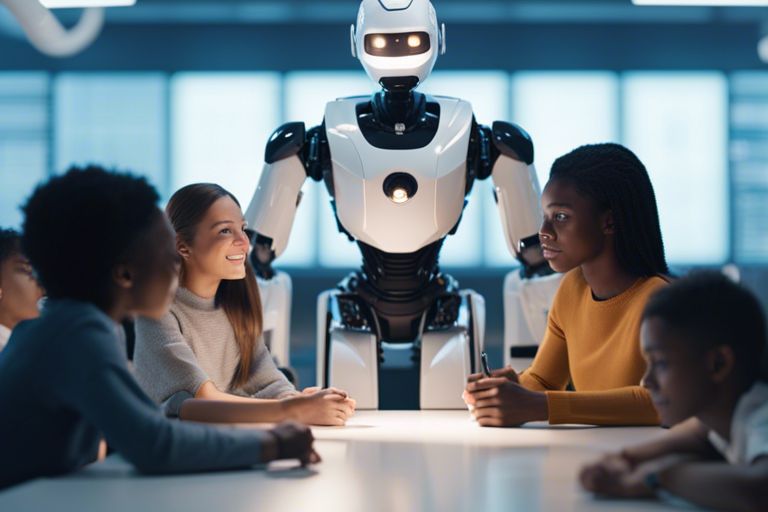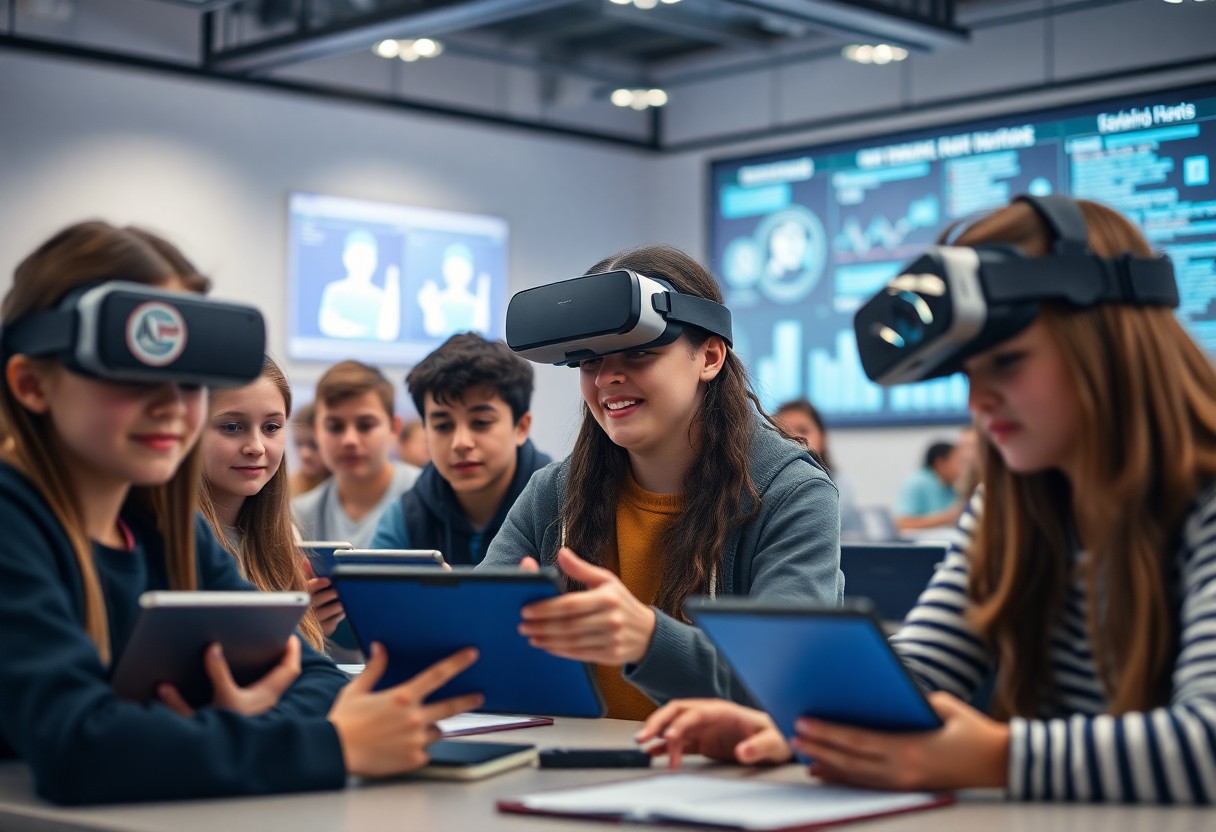Artificial Intelligence is revolutionizing the landscape of education, challenging traditional teaching methods, and paving the way for personalized and efficient learning experiences. As AI continues to advance, students can benefit from tailored lesson plans, interactive learning tools, and real-time feedback. However, concerns over privacy and dependence on technology raise important questions about the future of education. Will AI be the key to unlocking individual potential, or will it overshadow human connection and critical thinking skills? The role AI will play in education is a complex and evolving discussion that requires careful consideration and analysis.
The Current State of Education
Before delving into the potential impact of AI on the future of education, it is important to understand the current state of education. As it stands, many educational institutions primarily rely on traditional teaching methods and human instructors, which have both benefits and limitations.
Traditional Teaching Methods
Any discussion about the current state of education must acknowledge the prevalence of traditional teaching methods, including lectures, textbooks, and in-person interactions. While these methods have been the cornerstone of education for centuries, they may not adequately cater to the diverse learning styles and needs of every student. Moreover, the one-size-fits-all approach inherent in traditional teaching can hinder personalized learning experiences.
Limitations of Human Teachers
Limitations in the current education system are often tied to the inherent constraints of human teachers. While educators play a vital role in shaping young minds, they are not without limitations. Human teachers can only work for a fixed number of hours a day and are susceptible to fatigue, emotions, and biases that can impact their teaching effectiveness. Additionally, teachers may not always have the training or resources to address the individual needs of every student in a classroom setting.
Understanding the current state of education is crucial in exploring how AI can complement existing practices and address some of the limitations faced in traditional teaching methods. By leveraging AI technologies, educators can potentially enhance personalized learning, provide real-time feedback, and create more inclusive and engaging learning environments.

The Rise of AI in Education
You may have noticed a significant rise in the use of AI-powered tools in educational settings in recent years. These tools, ranging from smart tutoring systems to virtual learning assistants, are revolutionizing the way students learn and teachers teach.
Early Adoption of AI-Powered Tools
AIPowered tools are being adopted early on by educational institutions looking to enhance the learning experience for students. These tools have the capability to personalize learning by providing tailored lessons based on individual progress and learning styles. Additionally, they can offer immediate feedback to students, allowing for a more interactive and engaging learning environment.
Increasing Accessibility and Affordability
The integration of AI in education is also leading to a significant increase in accessibility and affordability. With the availability of online courses and virtual classrooms powered by AI, students from all around the world can access quality education without the need to physically attend a traditional school. This democratization of education is breaking down barriers and providing opportunities for individuals who may not have had access to education otherwise.
Personalized Learning with AI
Some educators believe that the future of education lies in personalized learning facilitated by artificial intelligence (AI). AI has the potential to revolutionize traditional teaching methods by providing tailored learning experiences for each student.
Adaptive Assessments and Feedback
On the forefront of personalized learning with AI are adaptive assessments and feedback systems. These systems use algorithms to analyze student responses in real time, pinpointing their strengths and weaknesses. This allows educators to provide targeted feedback and interventions, ensuring that each student receives the support they need to succeed.
Tailored Instruction and Learning Paths
Adaptive learning platforms can also offer tailored instruction and learning paths based on individual student needs. By collecting data on student performance and engagement, AI can create customized learning experiences that cater to the unique learning styles and pace of each student.
Adaptive instruction not only keeps students engaged and motivated but also ensures that they are challenged at the right level to promote academic growth. This individualized approach to learning has the potential to transform education, making it more accessible and effective for all students.
Intelligent Tutoring Systems
Unlike traditional educational methods, Intelligent Tutoring Systems (ITS) leverage artificial intelligence to provide personalized learning experiences for students. These systems use algorithms to adapt to each student’s learning style, pace, and preferences, offering a customized curriculum to enhance comprehension and retention.
One-on-One Support and Guidance
Systems equipped with ITS can offer one-on-one support and guidance to students, mimicking the experience of having a personal tutor. This level of individualized attention can significantly benefit learners, especially those who may struggle in a traditional classroom setting. By tailoring lessons to the specific needs of each student, ITS can help improve academic performance and boost confidence.
Real-Time Intervention and Remediation
For students who require additional assistance, ITS can provide real-time intervention and remediation. These systems can identify areas where a student is struggling and offer immediate support to address the issue. This proactive approach not only prevents learning gaps from forming but also ensures that students have the resources they need to succeed.
Support provided by ITS in the form of real-time intervention can be crucial in helping students stay on track and overcome obstacles in their learning journey. By offering immediate feedback and targeted assistance, these systems empower students to reach their full potential.
AI-Driven Content Creation
Once again, artificial intelligence is revolutionizing the way educational content is created. AI algorithms can now generate custom learning materials tailored to the needs of individual students. By analyzing student data and behavior, AI systems can create engaging and personalized content that adapts to each student’s learning style and pace.
Automated Grading and Feedback
Content created by AI can also be used for automated grading and providing instant feedback to students. This not only saves teachers time but also allows students to receive immediate responses on their work. AI algorithms can evaluate student assignments, provide detailed feedback, and track progress efficiently, enabling a more personalized learning experience.
Dynamic and Interactive Learning Materials
To further enhance the learning experience, AI-driven content creation enables the development of dynamic and interactive learning materials. These materials can include simulations, virtual reality experiences, and gamified lessons that engage students in a more immersive way. By incorporating interactive elements, students can actively participate in the learning process, leading to better retention and understanding of the material.
The integration of AI in content creation opens up a world of possibilities for educators to deliver engaging and tailored educational materials to students. With dynamic and interactive learning materials, students can benefit from a more hands-on and personalized approach to learning, ultimately improving their academic performance and fostering a love for learning.
Virtual Learning Environments
Immersive and Interactive Experiences
One of the most exciting aspects of virtual learning environments is the ability to provide immersive and interactive experiences for students. Through AI-powered simulations and virtual reality tools, students can step into historical events, explore complex scientific concepts, or practice real-world skills in a safe and controlled environment. This hands-on approach to learning can greatly enhance student understanding and retention of information.
Enhanced Student Engagement and Motivation
Engagement is key to successful learning, and AI can play a significant role in enhancing student engagement and motivation in virtual learning environments. By personalizing the learning experience based on individual student needs and preferences, AI algorithms can keep students challenged and interested. Gamification elements, such as rewards and progress tracking, can further motivate students to actively participate in their education.
Moreover, AI-powered virtual tutors can provide immediate feedback and guidance to students, creating a supportive learning environment that encourages exploration and experimentation. This personalized approach can help students stay focused and motivated throughout their educational journey.
AI-Assisted Teacher Professional Development
For educators, continuous professional development is important to keep up with evolving teaching methods and technologies. AI can revolutionize teacher training by providing personalized support and insights tailored to individual needs, ultimately enhancing the quality of education imparted to students.
Data-Driven Insights and Coaching
Insights: AI can analyze vast amounts of data collected from classrooms and educational resources to offer educators valuable insights into their teaching methods. By identifying patterns and trends, AI can suggest improvements, highlight areas of strength, and provide actionable recommendations to enhance teaching effectiveness.
Personalized Training and Support
Coaching: AI-powered systems can offer personalized coaching to teachers based on their unique teaching styles, goals, and areas of growth. This tailored approach ensures that educators receive the support they need to continually improve their skills and deliver impactful lessons to their students.
Data-Driven: By leveraging AI for personalized training and support, teachers can benefit from targeted professional development programs that address their specific needs and challenges. This data-driven approach enables educators to maximize their potential and create a more engaging and effective learning environment for their students.
The Role of AI in Special Education
Despite the challenges that students with disabilities face in traditional educational settings,
Supporting Students with Disabilities
AI has the potential to revolutionize special education. By providing personalized learning experiences tailored to individual needs and learning styles, AI can help bridge the gap for students who require additional support. Whether it’s through interactive tutoring systems, speech recognition software, or assistive devices, AI tools have the power to enhance the educational journey for students with disabilities.
Supporting students with disabilities through AI can also offer opportunities for independence and empowerment. With AI technologies, students can receive immediate feedback, individualized attention, and adaptive learning experiences in ways that may not always be feasible in a traditional classroom setting. By leveraging AI, educators and specialists can better understand the unique needs of each student and provide targeted interventions to support their academic and social-emotional growth.
Addressing Individual Needs and Challenges
For students with disabilities, one of the most significant benefits of AI in special education is its ability to address individual needs and challenges. AI-powered tools can analyze data in real time, track progress, and adjust instruction accordingly to meet each student’s specific needs. By personalizing learning experiences, AI can help students reach their full potential by focusing on areas where they need the most support.
For example, AI can analyze patterns in student performance to identify areas of strength and weakness. This data can help educators tailor their teaching strategies to better support students with disabilities and create a more inclusive learning environment. Additionally, AI can provide students with alternative ways to demonstrate their knowledge and skills, such as through voice-activated technologies or interactive simulations.
Role AI has a vital role to play in the future of special education, offering innovative solutions to support students with disabilities and cater to their individual needs. By leveraging AI technologies, educators can create more inclusive and personalized learning experiences that empower students to succeed academically and beyond. With AI as a tool for personalized learning, the possibilities for students with disabilities are endless, opening doors to new opportunities and breaking down barriers to education.
Ensuring Equity and Access in AI-Driven Education
Mitigating Bias and Inequality
To ensure equity and access in AI-driven education, it is crucial to address bias and inequality within the algorithms and technologies used. AI systems are only as fair as the data they are trained on, and if this data is biased, it can perpetuate and even exacerbate existing inequalities. It is necessary to implement measures such as diverse data sets, regular audits of algorithms, and transparency in AI decision-making processes to mitigate bias and ensure fair outcomes for all learners.
Promoting Inclusive and Diverse Learning Environments
To promote inclusive and diverse learning environments through AI-driven education, educators must prioritize representation and accessibility in the content and resources provided. AI can personalize learning experiences and cater to individual needs, bridging gaps and fostering inclusivity for learners of all backgrounds and abilities. By embracing diversity in the design and implementation of AI technologies, education can be more engaging, effective, and equitable for all.
Inclusive and diverse learning environments encompass not only various demographics but also different learning styles, preferences, and abilities. AI has the potential to adapt to each student’s unique learning needs and empower educators to create personalized learning experiences. By catering to individual strengths and challenges, AI can help students thrive and succeed in ways that traditional education may not always achieve.
Access: Ensuring equitable access to AI-driven education is crucial in addressing disparities and leveling the playing field for all learners. By providing affordable and widespread access to AI technologies and incorporating them into educational systems globally, we can empower students from diverse backgrounds to learn, grow, and succeed in the digital age.
Addressing Concerns and Challenges
Job Displacement and Teacher Roles
All technological advancements come with concerns, and AI in education is no different. One of the most significant concerns is the fear of job displacement among teachers. While AI can automate certain administrative tasks and provide personalized learning experiences, some worry that it may replace teachers altogether. However, it’s important to note that AI is meant to augment and support teachers, not replace them. Teachers will still play a crucial role in education by providing mentorship, emotional support, and critical thinking skills that AI cannot replicate.
Privacy and Security in AI-Driven Education
Any time data is involved, privacy and security become major concerns. With AI-driven education, there is a wealth of student data being collected and analyzed to personalize learning experiences. It’s crucial to address privacy issues to protect students’ sensitive information from data breaches or misuse. Schools and educational institutions must implement robust security measures and adhere to strict privacy regulations to ensure the safety of their students’ data.
The implementation of AI in education also raises questions about the transparency of algorithms used to make decisions about students. It’s imperative for educators, policymakers, and AI developers to work together to establish guidelines and standards for ethical AI use in education.
Challenges
The integration of AI in education presents both opportunities and challenges. While AI can help personalize learning, improve efficiency, and provide valuable insights, there are risks involved such as data privacy concerns and the fear of job displacement. It’s crucial for stakeholders to address these challenges proactively to harness the full potential of AI in revolutionizing education.
The Future of Work and Skills
Preparing Students for an AI-Driven Economy
After considering the rapid advancements in artificial intelligence, it is evident that the future of work will be heavily influenced by AI technologies. To thrive in an AI-driven economy, students must be equipped with the necessary skills to adapt and succeed.
Fostering Essential Skills and Competencies
For a seamless transition into an AI-dominated economy, educational institutions need to prioritize fostering vital skills and competencies that are irreplaceable by AI. While technical skills are vital, soft skills such as critical thinking, creativity, adaptability, and emotional intelligence will be key differentiators in a workforce where AI can handle routine tasks.
Developing skills and competencies that complement AI rather than compete with it will be crucial for individuals seeking to remain relevant in the future job market. Collaboration, problem-solving, and communication skills will play a vital role in ensuring that humans can work effectively alongside AI technologies.
Global Implications and Collaborations
Not only will AI revolutionize education within individual countries, but it also has the potential to transform education on a global scale through collaborations and partnerships between institutions worldwide. By sharing resources, best practices, and research findings, educators can leverage AI technologies to enhance learning experiences for students across borders.
Cross-Border Partnerships and Initiatives
Forging collaborations between educational institutions in different countries can lead to the development of innovative AI-powered tools and techniques that cater to diverse learning needs. These partnerships can facilitate cultural exchange, promote language learning, and foster a greater understanding of global issues among students. Through joint research projects and exchange programs, educators can harness the power of AI to create a more interconnected and knowledge-sharing global education community.
Addressing Global Education Challenges
CrossBorder collaboration enabled by AI can help address some of the most pressing challenges facing education systems worldwide, such as access to quality education, language barriers, and limited resources. AI tools can provide personalized learning experiences, language translation services, and virtual classrooms to bridge the gaps that prevent many students from receiving a high-quality education. By harnessing AI technologies, educators can work towards creating more inclusive and equitable learning opportunities for all students, regardless of their geographical location or socio-economic background.
Education is the key to unlocking a brighter future for societies around the world, and AI has the potential to democratize access to quality education on a global scale. By promoting cross-border collaborations and leveraging AI technologies, educators can break down barriers that hinder learning and empower students to reach their full potential. Embracing the possibilities of AI in education can revolutionize the way knowledge is shared and transform the future of learning for generations to come.
Regulatory Frameworks and Standards
Establishing Guidelines and Protocols
An vital aspect of integrating AI into education is the establishment of clear guidelines and protocols to ensure that AI systems operate ethically and effectively. Keeping in mind the potential risks associated with AI in educational settings, such as bias in algorithms or data privacy concerns, it is crucial to set up frameworks that prioritize the well-being of students and educators.
Ensuring Accountability and Transparency
With the increasing use of AI in education, there is a growing need to ensure that these systems are accountable for their decisions and transparent in their operations. Understanding how AI algorithms reach conclusions and make recommendations is vital for maintaining trust and addressing any potential issues that may arise.
1. Personalized learning experiences tailored to individual student needs.
2. AI tutors providing immediate feedback and support to students.
3. Enhancing student engagement and motivation in the learning process.
4. Streamlining administrative tasks to improve efficiency for educators.
5. Analyzing big data to identify trends and optimize teaching strategies.
6. Fostering digital literacy skills for future workforce readiness.
Conclusion
Hence, it is evident that AI will play a significant role in shaping the future of education. With advancements in technology, AI has the potential to revolutionize learning by personalizing education, providing real-time feedback, and enhancing the overall learning experience. However, it is crucial for educators to embrace these changes and adapt their teaching methods to harness the full potential of AI in education.
As we move forward, it is vital to strike a balance between the use of AI and human interaction in education. While AI can automate certain tasks and provide valuable insights, the role of human educators in inspiring and guiding students cannot be replaced. By effectively integrating AI into the educational system, we can create a more efficient and effective learning environment that truly prepares students for the challenges of the future.
FAQ
Q: What is the role of AI in the future of education?
A: AI is expected to revolutionize education by personalizing learning experiences, automating administrative tasks, and providing valuable insights to educators.
Q: How will AI personalize learning experiences for students?
A: AI algorithms can analyze data on student performance and behavior to create customized learning paths tailored to individual strengths and weaknesses.
Q: Can AI help in automating administrative tasks for educational institutions?
A: Yes, AI can streamline administrative tasks such as grading, scheduling, and student communication, allowing educators to focus more on teaching and mentoring students.
Q: Will AI replace teachers in the future of education?
A: While AI can augment teaching by providing resources and support, the human element of teaching, such as empathy and emotional connection, cannot be entirely replaced by technology.
Q: How can AI improve accessibility and inclusivity in education?
A: AI-powered tools can provide personalized support for students with diverse learning needs, making education more accessible and inclusive for all learners.
Q: What are the potential challenges of integrating AI in education?
A: Challenges include data privacy concerns, bias in algorithms, and the need for educators to adapt to new technology and teaching methods.
Q: How can educators prepare for the future of education with AI?
A: Educators can stay abreast of new technologies, receive training on AI tools and platforms, and be open to incorporating AI into their teaching practices to prepare for the future of education.




